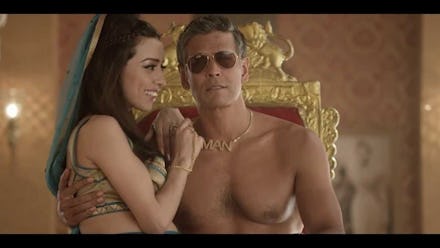The Old Spice Mantastic Man's Dirty Trick

In Old Spice's new advertising campaign in India, an actor boats about his vast array of talents, wealth, and experiences: all apparently "mantastic" attributes of the spicy deodorant.
Here's another:
The "Mantastic Man" campaign has been well received by viewers, due mostly to its tongue-in-cheek nature. The interactive Twitter campaign, with personal responses, is being hailed as a "fantastic approach."
While the campaign might be successful on paper, and the creative team obviously skilled, the tongue-in-cheek nature of the advertisement makes me uncomfortable. Using wit and high-quality visuals makes for sound advertising, but when parodying stereotypes is used to reinforce the same stereotypes, you wonder what sentiments the advertisement is actually trying to address.
The exaggerated portrayal of what construes masculinity in the ad is supposed to be an ironic take on earlier Old Spice ad campaigns like, "The Man Your Man Could Smell Like." But to me it comes across as the glorification of that ideal man who possesses both natural and acquired talents in abundance, and is obnoxious enough to wax eloquent about them. Obviously the women can't help but be subservient to such an apostle of the male race.
When I discussed this with a few people, I was told to to learn to take a joke. But, there is a problem. I love parodies. I do. I love them for challenging the original premise, not strengthening it.
When interpreting laws, students often turn to the "intent" of the legislators. I tried to employ the same rationale to interpreting the ad, and this is what I found: N. Ramesh, the marketing manager for Old Spice India, said in an interview, "Everyone has it in them to be 'mantastic' and Old Spice will help men in India navigate the seas of manhood, smelling like a 'mantastic' man."
In an interview with Livemint, advertising expert Louella Rebello said, "It’s an ad for male deodorant. We aren’t selling heart stents here. Why does a man wear deodorant? To impress his pet? Success with the ladies is the agenda, right? So why not take that to some ridiculous level and while you are at it, throw in biceps, chest hair, and helicopters too? It’s all part of the wonderfully over-the-top tone of the ad."
Given that the manufacturing and advertising industry is of the opinion that a personal hygiene product needs to appeal to one's sexual image, both with respect to manhood and "success with the ladies," I don't think I get the joke.
Of course, the ad appeals to viewers who appreciate parodies. Men and women that I discussed the ad with were all of the general opinion that it was hilarious, because obviously it made fun of ridiculous masculinity stereotypes. Surely, they said, it's clear that nobody's taking those claims seriously, and the over-the-top nature just reinforces that certain stereotypes can be actually funny, owing to their removal from reality.
This is a fair interpretation of the campaign, and a desirable one, if it weren't for the fact that the parody doesn't destabilize the masculinity ideal. It uses that ideal to add an element of sexual dominance, as evidenced by the coy women in the background and the overt implication that masculinity, success, and sexual prowess are linked to using the product. So, while we applaud the creative content of the ad, we need to step back for a second and assess the social impact this sort of advertising can have on gender roles.
While it is problematic to blame negative tendencies in people solely on external influences, it is also true that media and advertising play an important role in social conditioning.
A study conducted this year at the University of Manitoba characterized hyper-masculinity by four attributes: toughness, violence, dangerousness, and calloused attitudes toward women and sex. The study found that 56% of advertisements in magazines targeted at men contained at least one hyper-masculine attribute.
While the pressure that girls face trying to adhere to ideals of female beauty is critiqued heavily, similar media-created ideals are also having a significant negative impact on men. Young men feel forced to work out, consuming protein supplements not so that they can be healthy, but so that they can bulk up to achieve the muscular ideal.
In a 2004 study published in the Journal of Social and Clinical Psychology, researchers found that exposure to ideals of male attractiveness on television can increase muscle dissatisfaction and consequent depression. As PolicyMic's resident masculinity columnist Jack Fischl noted, "Men are conditioned not to admit to deficiencies, perceived or otherwise."
My friend Shashank Reddy confirmed this. "If boys want to be seen as 'real men', they are made to believe that fighting isn't such a bad thing," he told me. "You've got to be strong and tough. If somebody is different, they're bullied for not being manly."
Clearly, there are serious ramifications of an advertising culture which bombards young men with an ideal of masculinity. In the case of the Old Spice commercials, it's not only an ideal body image, but being successful in masculine ways that defines what the masculine aspiration should be. All so that the demure female attendants (love interests? I can't really tell) can be appeased. Women following you around and harassing you after you spray deo? Oh no, that's the Axe Effect. I'm not even going to delve into how it absolutely undermines women's discretion.
It's great to be confident. It's fine to be masculine. But we should ask ourselves what's being advertised to us and why — and what any of this has to do with deodorant.